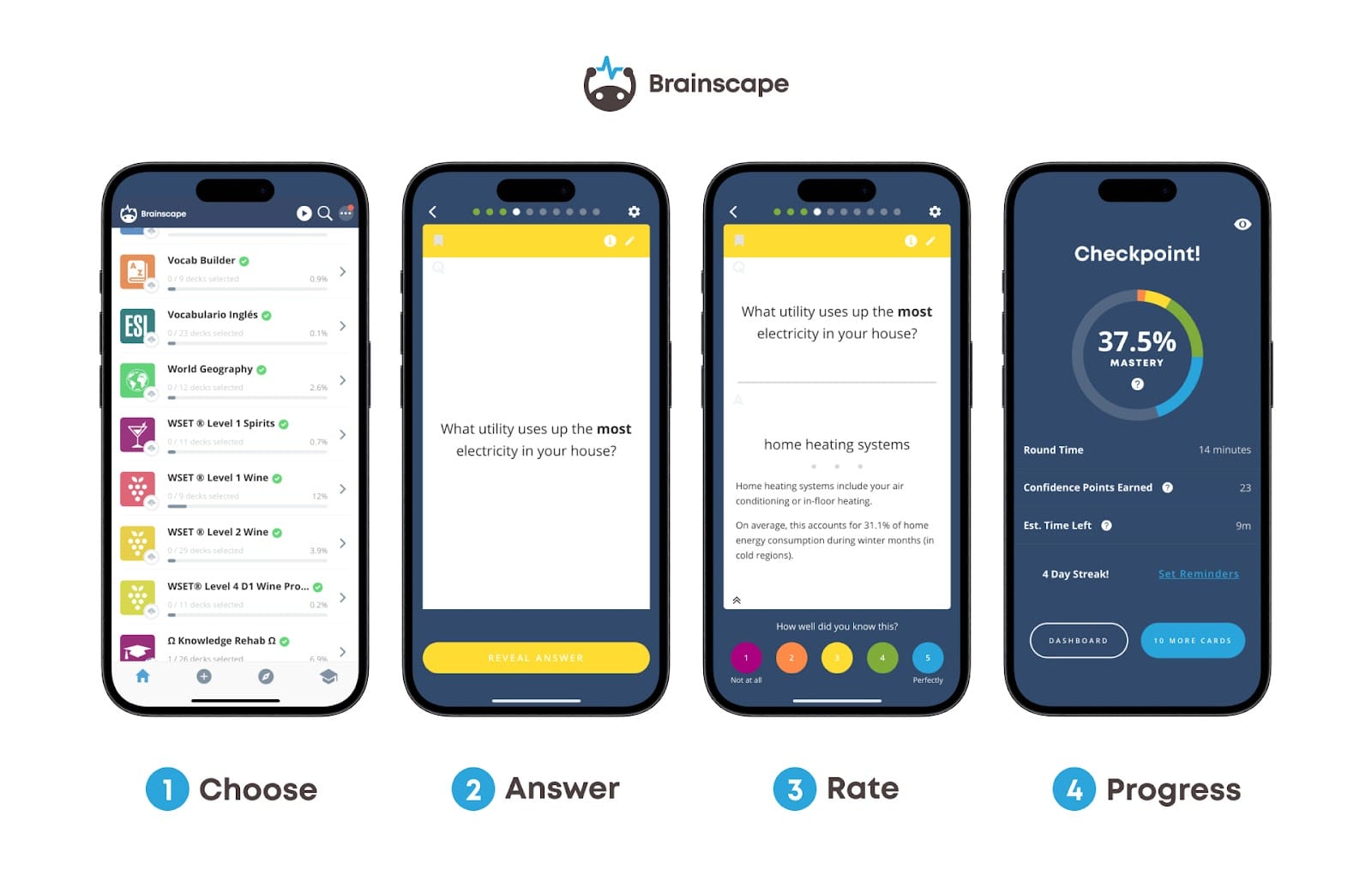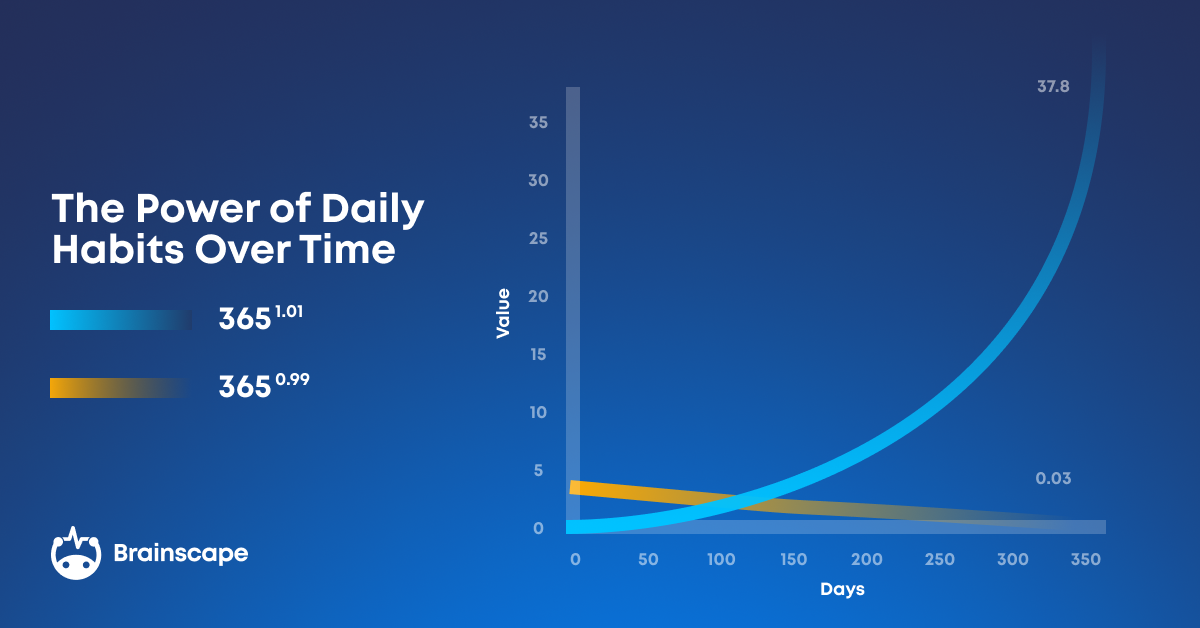Willpower and self-discipline are harder to learn than ever before. Our brain is constantly bombarded by notifications, beeps, and flashes on par with a stroll down the Las Vegas Strip.
It can even start to feel like the term “willpower” is a bit of legend, something people speak of in the same hushed tones as “the prophecy” or “the chosen one". But willpower isn’t some generational ability that comes with a birthmark and an ancient scroll. It’s a skill you can build with the right plan. They’re the product of concentrated effort, an investment that pays dividends for life.
Your productivity heroes may make their habits seem effortless today, but it only seems so because they spent a huge amount of time to make those healthy habits their "normal". In this article, we'll show you how to do the same!
But hold up... why should you listen to us?
Who Are We & Why Do We Know What We Are Talking About?

Brainscape is a flashcard app developed to help students of all ages master knowledge-intensive subjects. As a team of people that is passionate about learning, it has long been our priority to understand how people learn—and how they learn most efficiently—which includes confronting challenges like procrastination, distraction, and a lack of motivation, discipline, and willpower.
Our adaptive flashcard app has been proven to increase your attention span but there are many other things you can do to prolong the endurance of your focus and build your discipline and willpower like a muscle! So, without further ado, let's dive in...
Don’t Try to Hack Success; Build Towards It
If you want to move past band-aids and quick tips and start to improve your base dedication and work ethic, you can train yourself to work quicker, faster, and more efficiently right now.
For example, let’s imagine two golfers. We’ll call them Larry and Gary.
Larry is quick to tell you that he loves to golf and is quick to chat about getting his score down. He can recommend dozens of articles about correcting your swing and spends hours watching TikTok golf analysis. However, when it comes to heading to the driving range, Larry finds an excuse. He slept 7 hours instead of 8, so he’ll be “off.” He’s got dinner later, and he doesn’t want to be sweaty. He was gonna play with his friend Jose, but Jose got stuck at work, and he’s not gonna play ALONE.
Gary professes the same love of golf and wants to improve just like Larry does. But Gary is able to ask himself the real question, which is what do I have to do to improve, and am I pursuing that every day. Gary’s tired? Maybe it’s a good chance to use his exhaustion to expose some of his bad habits at the range. Gary shows up at dinner a little sweaty, and is happy to explain that it’s because he was out working on his swing. His friend cancels? Their loss! In fact, without social distractions, he can really focus on his game.
Now, fast-forward a year. Who do you think is going to be the better golfer? I’d lay my money on the table that Gary is going to trounce Larry every time. That’s because Larry theoretically wants to be good at golf, but Gary is the one actually playing golf regularly.

There is no replacement for time and hard work, and stopgap solutions can only obscure a lack of growth.
Productivity is similar in that becoming more productive requires you to make changes to your life and behavior. You can buy the newest specialized planner and pay for fancy to-do list software. Maybe you bought yourself a smartwatch, telling yourself it would help you keep track of your time, only for it to become a wrist-mounted reminder that you did nothing.
The responsibility of building and improving upon any skill, whether it be a sport, grinding in a video game, or time management skills, lies squarely upon your shoulders. As the saying goes: a bad craftsman blames their tools.
Clearing Your Mind & Schedule to Build Self-Discipline

If you’re reading this article, it’s likely because your current strategies to build self-discipline aren’t working.
When something isn’t working, it’s time to do a full evaluation of why, and make the needed changes. The first thing you need to do is remove the things that are actively holding you back.
For productivity, this means the little gremlins that throw a wrench in the gears and bring your day to a grinding halt. Research shows that all those small decisions we make in our day, compounded by the temptations that attempt to derail us, erode our willpower until we end up in bed thinking about all the things we didn’t get done.
Decision fatigue is real. So, dedicate time to eliminating these decisions before they sap your energy. Plan ahead and remove uncertainty.
For example, you can dedicate your Sunday to planning out the upcoming week, from meals and workouts to social activities. That way, during the weekdays themselves, you won't have to wonder, 'ooh, what’s in the fridge?' and 'what can I make?', saving that mental energy instead for other more important decisions and activities.
Need some help on what distractions to knock out and how? Let’s start with these:
- Substance procrastination. The number one most effective way to avoid vaping (or anything else) is not to own a vape. The same goes for food and drink. Enjoying treats in moderation is important, but remember that the items in your house are what you will consume every day.
- Small screen: mental sinkhole. Put away your phone. Even having it on flight mode in the same room is distracting. The subconscious concentration required not to look at it sucks your brainpower.
- Trash the time-sucking tabs. If you’re working on your computer, maybe hide away time-wasting apps, favorite websites, and games so that they can’t make puppy-dog eyes at you mid-assignment. You can use software to block your most distracting websites.
- Dodge closet indecision. Some successful people even wear the same thing every day. Think of Steve Jobs, Greta Thunberg, and Darth Vader. This isn’t because they have an unhealthy fascination with black turtlenecks or capes, but because they’re minimizing the time spent on small decisions. Try planning your wardrobe for the week every Sunday, so you won't have to think about it again until the following Sunday.
- Strike down inbox spam. Unsubscribe from email lists rather than deleting fourteen “one-time” sale emails a day.
- Make your mission clear. Keep a to-do list of small tasks to free up that space in your mind.
- Make a habit of weekly planning. Set yourself a recurring appointment each Sunday to plan your meals, social activities, phone calls, and even wardrobe choices for the week. Waking up to a day with fewer decisions frees mental clarity to focus on your work.
Blaise Pascal once said:
“Clarity of mind means clarity of passion, too; this is why a great and clear mind loves ardently and sees distinctly what it loves.”
A clear mind helps you to focus on your goals AND reminds you why you pursue those goals.
Build Your Willpower for Study Discipline
Now, with a clear mind, bad habits identified and disassembled, you have the space to build better habits. You can now fill the vacated real estate with positive and productive things before the distractions of the world can return to roost.
The idea of “building your willpower” may call up an image of a monk beneath a waterfall. Remove the drama and performance, however, and you’ll find that a desire and pursuit to improve yourself is not un-monastic. Make your mind your monastery. Perfect your mental Wing Chun to defeat daily enemies.
So what are some concrete practices you can follow to increase your willpower? Here are some great starting points:
- Postpone rewards. Also known as “dopamine fasting,” if you want to call it something a little more metal. Push yourself to make rewards just that—rewarding. The longer you can extend the gap between positive behavior and reward, the stronger your willpower muscle will become.
- Exercise every day. It doesn’t have to be long or complicated, but it has to challenge you every day. Research has found that even a 7-minute workout every day can build self-discipline. Think of it as a micro-example of your dedication to daily improvement.
- Plan a routine. A clear, long-term plan that translates into actionable everyday tasks is the secret to success. (Check out our guide on designing your ideal personalized study routine.)
- Use tools. Thrive on social commitment? Make an agreement with a buddy to hold each other accountable. Love a gamified sense of achievement? Use habit-reward apps like Habitica that reward your habits with XP. Need to learn efficiently? Brainscape uses spaced repetition to cut your study time in half.
Work to Make the Most of Yourself

If you follow these steps, but most importantly, truly apply yourself to self-improvement, you WILL change. You'll create more study discipline. It won’t be easy, but the most impressive things aren’t. In fact, I would implore you to take the effectiveness of this advice to heart BECAUSE of its simplicity.
Since the dawn of time, the equation of determination plus work equals improvement has remained true. "Laziness" is a myth. You are the product of centuries of human experience. You CAN build your willpower.
Look at willpower not as an innate trait but as an underdeveloped skill, and one that you can train. Then, you can take the first step to make the most of your one precious life.
Additional Reading
- Finding Study Motivation When You Want to Procrastinate
- How to create a study routine that maximizes productivity
- Is waking up early bullsh*t?
References
American Psychological Association. (2012, December 1). What you need to know about willpower: The psychological science of self-control. https://www.apa.org. https://www.apa.org/topics/personality/willpower
Amir, O. (2024, February 20). Tough Choices: How making decisions tires your brain. Scientific American. https://www.scientificamerican.com/article/tough-choices-how-making/
Crna, R. N. M. (2019, July 12). Are there any health benefits to a cold shower?https://www.medicalnewstoday.com/articles/325725#stronger-immune-system
Danziger, S., Levav, J., & Avnaim-Pesso, L. (2011). Extraneous factors in judicial decisions. Proceedings of the National Academy of Sciences of the United States of America, 108(17), 6889–6892. https://doi.org/10.1073/pnas.1018033108
Fraga, J. (2024, February 20). Dopamine fasting: Would a hiatus from pleasure make us better at life? Mic. https://www.mic.com/life/dopamine-fasting-would-a-hiatus-from-pleasure-make-us-better-at-life-19638162#goog_rewarded
Goyal, M., Singh, S., Sibinga, E. M. S., Gould, N. F., Rowland-Seymour, A., Sharma, R., Berger, Z., Sleicher, D., Maron, D. D., Shihab, H. M., Ranasinghe, P. D., Linn, S., Saha, S., Bass, E. B., & Haythornthwaite, J. A. (2014). Meditation programs for psychological stress and well-being. JAMA Internal Medicine, 174(3), 357. https://doi.org/10.1001/jamainternmed.2013.13018
Khidekel, M. (2019, July 16). 17 positive mantras that will make you feel powerful — even on a bad day. Thrive Global. https://community.thriveglobal.com/positive-phrases-mantras-promote-calm-stress-anxiety-relief/
Mattar, L., Farran, N., & Bakhour, D. (2017). Effect of 7-minute workout on weight and body composition. Journal of Sports Medicine and Physical Fitness/the Journal of Sports Medicine and Physical Fitness, 57(10). https://doi.org/10.23736/s0022-4707.16.06788-8
Mejia, Z. (2017, July 19). This simple speaking trick can make you more influential at work. CNBC. https://www.cnbc.com/2017/07/18/pausing-before-you-speak-can-help-you-be-a-more-effective-communicator.html
National Institutes of Health. (2024, June 17). Creating healthy habits. NIH News in Health. https://newsinhealth.nih.gov/2018/03/creating-healthy-habits
Pilat, D., & Krastev, S. (2024). Decision fatigue - the Decision Lab. The Decision Lab. https://thedecisionlab.com/biases/decision-fatigue
Watson, S. (2023, September 13). 7-Minute workout. WebMD. https://www.webmd.com/fitness-exercise/a-z/seven-minute-workout
